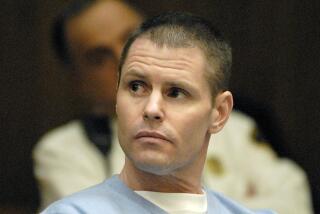Bulger Testifies on Wanted Brother
- Share via
WASHINGTON — For more than 40 years, William Bulger changed the subject when his brother’s name was raised.
That silence was broken Thursday when Bulger, president of the University of Massachusetts, testified before angry members of Congress about James “Whitey” Bulger, a Boston crime lord who disappeared in 1995, just as he was about to be indicted on murder, racketeering and extortion charges.
William Bulger, the former president of the Massachusetts Senate and one of the most powerful political figures in the Northeast, denied knowing James’ whereabouts or having information that could help authorities find him.
After invoking the 5th Amendment and refusing to answer questions at a hearing in December, Bulger agreed to testify Thursday only under a grant of immunity. He traveled to Washington with his wife, Mary, and several of their nine grown children. A compact man with ice-blue eyes, Bulger answered calmly as lawmakers pressed him about the brother whose work as an informant triggered a massive FBI scandal.
“I do not know where my brother is. I do not know where he has been over the past eight years,” Bulger told the House Committee on Government Reform. “I have not aided James Bulger in any way while he has been a fugitive. Do I possess information that could lead to my brother’s arrest? The honest answer is ... no.”
Four Democratic representatives from Massachusetts were among those questioning Bulger, 69, who earns $358,000 a year as head of the university system. One of them, Stephen F. Lynch -- who represents Bulger’s home district of South Boston -- was so incensed about abuses in the Boston FBI office that he declared, “In constitutional terms, this is a 40-year sinkhole.”
Rep. Dan Burton (R-Ind.) denounced the long-standing practice in the Boston FBI office of using criminals such as James Bulger as informants and corruption among Boston FBI agents who worked directly with him. One of those agents, Paul Rico, left the FBI for the jai alai business. Another, John Connolly, is serving a 10-year prison sentence for extortion and racketeering.
“I have called what happened in Boston the greatest failure in the history of federal law enforcement,” Burton said.
Agents grew so close to their informants beginning in the 1960s that they overlooked crimes as heinous as murder and protected associates of the mobsters working for them, according to government investigators.
Under the watch of the Boston FBI, four men were sent to prison for a killing they did not commit; two died behind bars and two were recently released after 30 years. It was Connolly who tipped off James Bulger that his indictment was imminent, court records show.
When Rep. Henry A. Waxman (D-Los Angeles) said that the tale of the two brothers was “almost like the biblical parable of Cain and Abel,” William Bulger countered with the story of the Good Shepherd.
“I care deeply for my brother,” he said. “But no one should construe my expression of concern as in any way condoning any illegal acts.”
Bulger sat calmly as Burton depicted him as the title character from the fable “The Emperor’s New Clothes.” He did not flinch when Rep. Christopher Shays (R-Conn.) chastised: “I am truly stunned that the president of a major university system would find it necessary to exercise his 5th Amendment rights, and then say he is only going to tell the truth if he is granted immunity.”
Bulger’s refusal to answer questions in December prompted Massachusetts Gov. Mitt Romney to call for Bulger’s resignation. Romney also sought unsuccessfully to eliminate Bulger’s position.
The panel asked Bulger repeatedly about a telephone call from James Bulger (now 71) soon after what his brother termed “his departure.” The planned call in 1995 came at the home of a longtime acquaintance of William Bulger’s in Quincy, south of Boston. Bulger said Thursday that in the four- to five-minute conversation, he told his brother he loved him and that he was “hoping for a happy ending.” James Bulger, said his younger brother, warned his family “not to believe everything that is being said about me.”
William Bulger said he felt no obligation to report the call to authorities, because under Massachusetts law, conversations between siblings can be considered privileged.
In Boston, James Bulger was renowned and feared as one of the city’s most dangerous criminals. But his brother said Thursday that beyond what he has read in newspapers, he knew nothing about James’ drug dealing or gun-running or the fact that he is wanted in connection with at least 21 slayings.
Asked whether he knew about James’ leadership of an infamous gang called the Winter Hill Mob, William Bulger replied, “The what?”
He said he never asked his brother for help as his own political career advanced, nor asked law enforcement to intercede on behalf of his brother.
On the contrary, he said, “the subject of my brother” had been “contentious” for him since his first speech in 1960, when an opponent told him he belonged in jail with his brother.
In his testimony, Bulger decried “overzealous government authority” and the press -- in particular, the Boston Globe. He accused a Boston FBI agent of leaking to the Boston Globe the 1988 story that first publicly named James Bulger as an informant.
That leak, William Bulger said, “had one purpose, pure and simple: bringing about the death of James Bulger.”
Bulger said he lives in hope that the worst charges against his brother “will prove groundless.”
Bulger testified before a grand jury in April 2001. Under the terms of his immunity grant, he could be prosecuted for perjury if statements he made here Thursday contradict what he told the grand jury.
More to Read
Sign up for Essential California
The most important California stories and recommendations in your inbox every morning.
You may occasionally receive promotional content from the Los Angeles Times.













